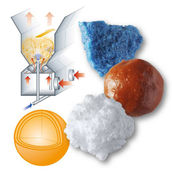Groundbreaking ceremony for a new Bayer polycarbonate plant at Caojing, Shanghai
Advertisement
With a groundbreaking ceremony for the construction of a new polycarbonate plant at Caojing, Shanghai, Bayer expands its activities in China. The company is investing around 450 million US dollars in this world-scale production complex which will produce the high-tech plastic Makrolon®. This facility is expected to start production in the second quarter of 2006 and will be expanded step by step according to the market development to a total capacity of 200,000 tons per year. Makrolon® is used in a broad range of applications, including the production of CDs and DVDs, headlamp lenses, glazing and roofing systems. There are plans to invest a total of around 3.1 billion US dollars in the integrated production site at Caojing. Bayer has allocated around 1.8 billion US dollars to the construction of polymer production facilities and in some cases has already got the construction under way. Alongside this are additional projects with a volume of 800 million US dollars which are to be implemented at a later point in time. Additional investments of about 500 million US dollars have been allocated to "NewCo". In this company, which is to become independent, Bayer will pool its chemicals business and parts of its polymer business with the aim of floating these on the stock exchange under a new name by the beginning of 2005.
Bayer's links with China go back to 1882, when the company first began marketing dyes on the Chinese market. Today, Greater China is Bayer's second largest single market in Asia, with sales of around EUR 1.1 billion in 2002, and the company employs over 2,600 people there. The People's Republic of China is also one of Bayer's main centers of global investment. The company is represented in Greater China by a total of 22 companies. 15 of them now have production facilities on stream in all business segments in which the company is active and local production accounts for an increasing proportion of sales.
The new site at Caojing, in the south of the rapidly growing City of Shanghai, is an ideal base for Bayer's future expansion plans. "The Shanghai region, with its well educated specialist staff and an excellent infrastructure, offers great conditions for this", said Dr. Hagen Noerenberg, Head of Bayer MaterialScience. Covering an area of approximately 1.5 square kilometers, Caojing will see the construction of state-of-the art world-scale production plants for polymer products in the next few years. This would guarantee high quality and cost-effective production, offering Bayer competitive advantages in the market, Noerenberg added.
In total, Bayer is planning two additional major projects alongside to the construction of the polycarbonate production plant. The construction of production facilities for polyisocyanates will make the site Bayer's most important basis for coating raw materials in this region. Since April 2003, raw materials in the Desmodur® N range have been produced in a plant with an annual capacity of 11,500 tons. Currently, a plant for polyisocyanate raw materials in the Desmodur® L range is under construction. After its completion, which is scheduled for the end of 2004, Bayer will have an annual capacity of 11,000 tons for this product range in Caojing. There are also plans to build a world-scale production plant for the base product HDI which will initially have a capacity of 30,000 tons and be completed by the end of 2006. Depending on the market development in the region, the capacity can, in an additional construction phase, be extended to a total of 50,000 tons per year. The raw materials, produced using the most up-to-date technology, are used for the production of high-quality polyurethane coatings for general industrial, automotive, wood and furniture coatings.
Another focus of investment will be the construction of world-scale production plants for the polyurethane raw materials MDI (diphenyl methane diisocyanate) and TDI (toluene diisocyanate). According to these plans, a production plant for crude MDI with an annual capacity of 230,000 will go into operation in 2008.
For TDI, the intention is to set up a plant with an annual production capacity of 160,000 tons which is due to be commissioned in 2009. MDI and TDI are important raw materials for the production of polyurethane foams for items such as mattresses and upholstered seating, and insulation for refrigerators.






























































